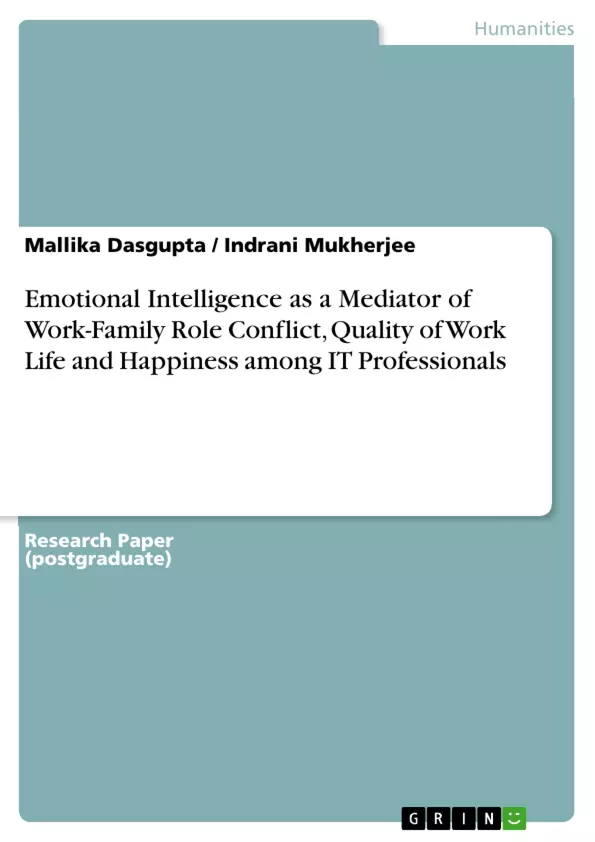Emotional Intelligence is considered to be a very powerful tool to an employee
to manage relationships and achieve success at workplace. The study explored
its relationship to some of the important psychosocial variables in order to assess
what exactly makes this component so useful indeed. The study included 120
IT professionals of Kolkata employed in public as well as private Private sectors.
The sampling was purposive in nature and included only those who were
interested to participate. It followed a correlational design to achieve its aim.
The findings indicated that Emotional intelligence promotes Happiness,
especially in case of female employees, and it also relates positively to Quality
of Work Life of employees. Emotional Intelligence bears a negative relationship
with Work-Family Role Conflict, indicating that Emotional Intelligence tunes
down the perception of Role conflict and thereby reduces the stress produced
by it.
Inhaltsverzeichnis (Table of Contents)
- Emotional Intelligence as a Mediator of Work-Family Role Conflict, Quality of Work Life and Happiness among IT Professionals
- Introduction
- Objectives
- Hypotheses
- Sample
- Method
- Tools
- Data Collection
- Results and Discussions
- Conclusion
- References
Zielsetzung und Themenschwerpunkte (Objectives and Key Themes)
This study investigates the relationship between emotional intelligence and several key psychosocial variables in IT professionals. It aims to understand how emotional intelligence impacts work-family role conflict, quality of work life, and happiness among these professionals. The study uses a correlational design to analyze data collected from 120 IT professionals in Kolkata.
- The role of emotional intelligence in managing work-family role conflict.
- The relationship between emotional intelligence and quality of work life.
- The impact of emotional intelligence on employee happiness.
- The importance of emotional intelligence in the IT sector.
- Gender differences in the relationship between emotional intelligence and these variables.
Zusammenfassung der Kapitel (Chapter Summaries)
- Introduction: The introduction lays out the conceptual framework of the study, highlighting the importance of emotional intelligence and its potential effects on work-family role conflict, quality of work life, and happiness. It discusses the growing importance of emotional intelligence in the workplace and its relevance to various psychosocial variables.
- Objectives: The study aims to investigate the relationship between emotional intelligence and work-family role conflict, quality of work life, and happiness among IT professionals in both government and private sectors.
- Hypotheses: Specific hypotheses are formulated to predict the relationship between emotional intelligence and the variables of interest. These hypotheses anticipate negative correlations between emotional intelligence and work-family role conflict, and positive correlations between emotional intelligence and quality of work life and happiness.
- Sample: The study utilizes a purposive sampling method, selecting 60 male and 60 female IT professionals from both private and public sectors in Kolkata. The participants are predominantly middle-class, aged 25-35, married, and have at least two years of experience in the IT sector.
- Method: The study employs a correlational design and utilizes various self-report inventories to measure emotional intelligence, quality of work life, work-family role conflict, and subjective happiness. Data collection involves interviews with participants, ensuring the completeness of questionnaires and providing deeper insight into the research problem.
Schlüsselwörter (Keywords)
This research explores the connections between emotional intelligence, work-life balance, family conflict, and job satisfaction within the Information Technology (IT) sector. It investigates the role of emotional intelligence in navigating work-family conflicts and its impact on quality of work life and happiness. The study also considers the potential for gender differences in these relationships.
Frequently Asked Questions
What is the relationship between Emotional Intelligence (EI) and Happiness?
The study found that EI promotes happiness, particularly among female IT professionals, by helping them manage emotions and relationships effectively.
How does Emotional Intelligence affect Work-Family Role Conflict?
EI has a negative relationship with work-family conflict, meaning that higher EI reduces the perception of role conflict and the stress associated with it.
What impact does EI have on the Quality of Work Life?
There is a positive correlation between Emotional Intelligence and the Quality of Work Life among IT professionals in both public and private sectors.
Why was the study focused on IT professionals in Kolkata?
IT professionals often face high stress and demanding work schedules, making EI a crucial psychosocial variable for their overall well-being and career success.
Are there gender differences in how EI impacts psychosocial variables?
Yes, the study indicated that the link between Emotional Intelligence and subjective happiness was especially prominent in case of female employees.
- Citation du texte
- Mallika Dasgupta (Auteur), PhD Professor Indrani Mukherjee (Auteur), 2010, Emotional Intelligence as a Mediator of Work-Family Role Conflict, Quality of Work Life and Happiness among IT Professionals, Munich, GRIN Verlag, https://www.grin.com/document/174394



